by Lisa Cooke | Mar 26, 2014 | 01 What's New, Conferences
I have roots in Indiana and have longed to travel to Hoosier state to conduct some much needed genealogy research. So you can imagine how happy I 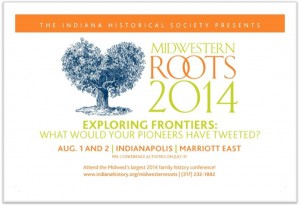 was to be invited to keynote at the upcoming Midwestern Roots 2014: Family History and Genealogy Conference being held August 1 and 2, 2014, Indianapolis, IN, at the Indianapolis Marriott East.
was to be invited to keynote at the upcoming Midwestern Roots 2014: Family History and Genealogy Conference being held August 1 and 2, 2014, Indianapolis, IN, at the Indianapolis Marriott East.
This year’s theme is a timely one: Exploring Frontiers: What Would Your Pioneers Have Tweeted? This conference promises to be a glorious melding of old and new with deep history sessions and the latest technology.
Here’s the scoop on the Midwestern Roots Conference:
Registration Opens March 26 with a $99 registration special price March 26-29, 2014.
Includes the two day conference and lunches.
Additional fee for banquet and some pre-conference activities.
Register online at www.indianahistory.org/midwesternroots or
call (317) 232-1882 from 10 a.m.-5 p.m. Thursday through Saturday during the special offer.
The Midwestern Roots 2014 Conference is your chance to get updated on the latest technology changes in family history research, resources and methodology, and I’ll be exploring that in my keynote Future Technology and Genealogy: 5 Strategies You Need. You’ll also experience:
• More than 30 stimulating lectures from nationally known speakers Warren Bittner, Lisa Louise Cooke, Joan Hostetler, Amy Johnson Crow, Thomas MacEntee, James H. Madison, Anne Gillespie Mitchell, Daniel S. Poffenberger, Curt B. Witcher and more
• The Great Google Earth Game Show presented by Lisa Louise Cooke (this will be an interactive, FUN, outside the box kind of session topped off with prizes!)
• Hoosiers and A New History for the Twenty-First Century presented by James H. Madison
• A Guided Tour of Ancestry computer lab taught by Amy Johnson Crow and Anne Gillespie Mitchell from Ancestry.com
• Genealogy Resources Library Workshop
• Writing, document preservation and photo preservation workshops
• Family History Market and Book Fair – open to the public
See you at the Midwestern Roots 2014 Conference!
by Lisa Cooke | Jan 27, 2015 | 01 What's New, History, Kids, School Records
In years past, a five-hour graduation exam was required for eighth graders (around 13 years old) in many U.S. states. It made me wonder: are questions they asked still relevant today? How well would we score? Are we smarter than an 8th grader from 120 years ago?
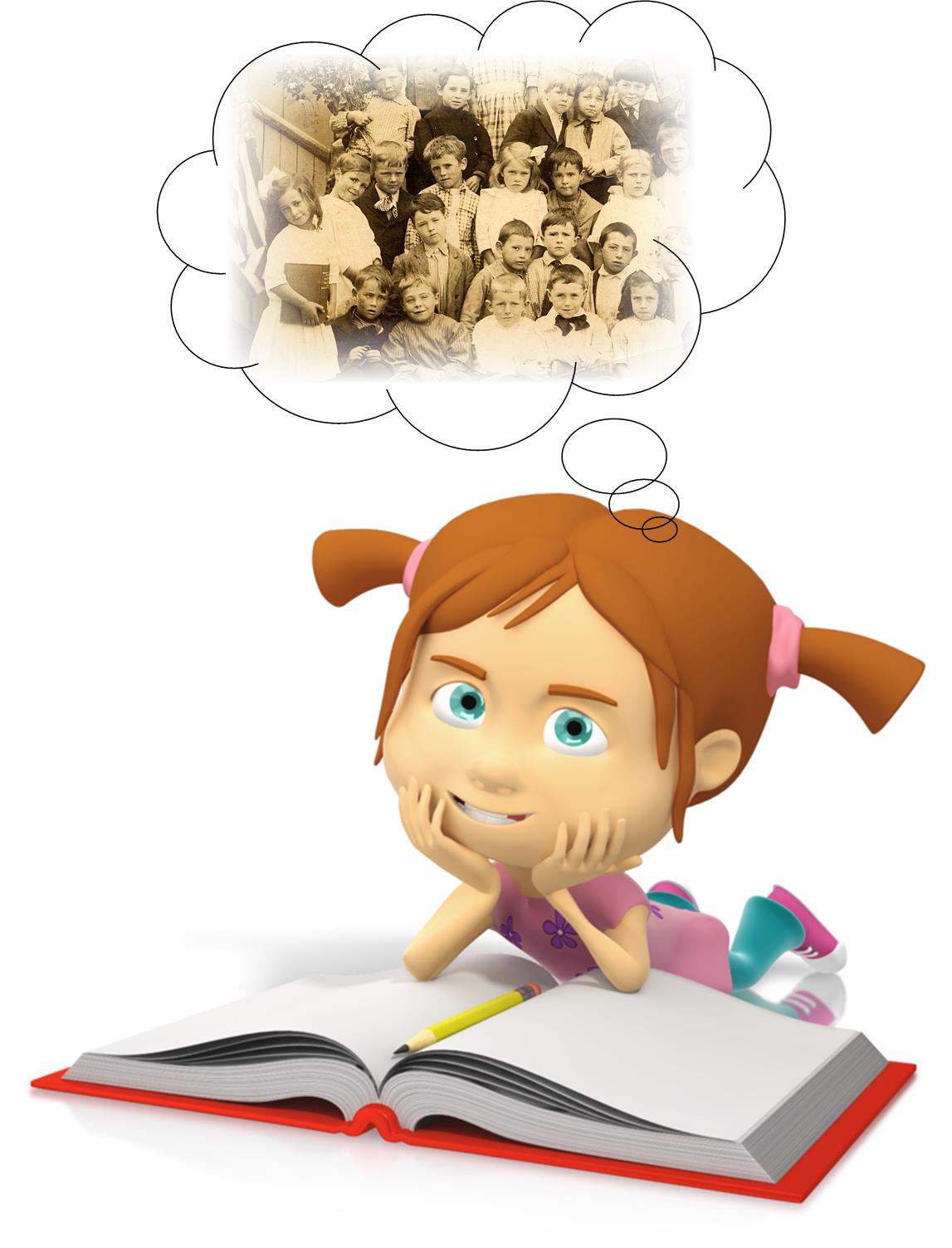
A copy of an 1895 graduation exam from Kansas has become famous since being circulated online. We tracked down the original exam at the Smoky Valley Genealogical Society in Salina, Kansas.
Here’s the Geography part of the exam, which took an hour (taken from a transcription at the above website):
1. What is climate? Upon what does climate depend?
2. How do you account for the extremes of climate in Kansas?
3. Of what use are rivers? Of what use is the ocean?
4. Describe the mountains of N.A. [presumably North America]
5. Name and describe the following: Monrovia, Odessa, Denver, Manitoba, Hecla, Yukon, St. Helena, Juan Fernandez, Aspinwall, and Orinoco.
6. Name and locate the principal trade centers of the U.S.
7. Name all the republics of Europe and give capital of each.
8. Why is the Atlantic Coast colder than the Pacific in the same latitude?
9. Describe the process by which the water of the ocean returns to the sources of rivers.
10. Describe the movements of the earth. Give inclination of the earth.
The Smoky Valley Genealogical Society has posted a copy of the original exam, along with links to the answers, at the above link. Their site also comments, “Many people forget that Kansas is an agricultural state. 8th grade was as far as many children went in school at that time. It was unusual for children to attend either a high school or a normal school because they were needed on the family farms.”
Wonder how each of our forebears would do on it? Consider following up on an ancestor’s level of education (like from a census entry) by finding a copy of a textbook, exam or another document showing the kinds of things they would have learned? The free Google Books is a great place to start! I devote an entire chapter to Google Books in the brand new Second Edition of my book The Genealogist’s Google Toolbox.
Learn more about researching your ancestor’s education here at Genealogy Gems:
Genealogy Gems Premium Podcast Episode 98 answers a listener’s question about finding Yearbooks. Sign in to your membership to listen, or become a member today.
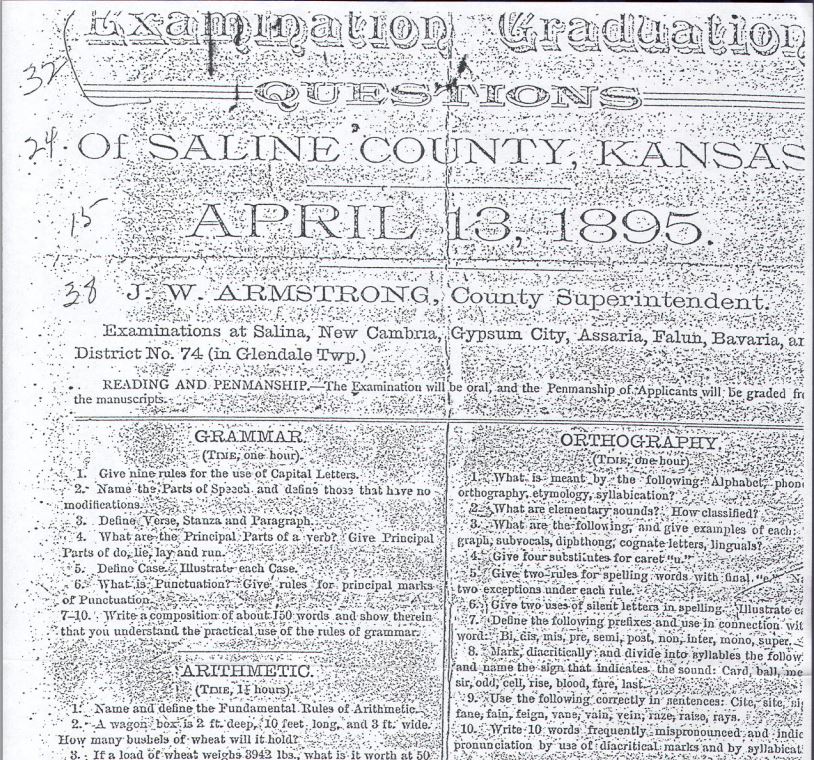
Image taken from exam posted by the Smoky Valley Genealogical Society, Salina, KS, http://www.rootsweb.ancestry.com/~kssvgs/school/exam1895/8th_exam_orig.pdf.
You’ll never look at “8th Grade Education” in a genealogical document the same way again!
by Lisa Cooke | Nov 4, 2016 | 01 What's New, Records & databases |
Swedish-American newspapers are our first stop as we head off the beaten path. This week you’ll discover special record collections of Burke County, North Carolina yearbooks, photo images for Scotland, and State Militia records. Also this week, German civil registrations, Utah divorces, and lots of Irish goodies.
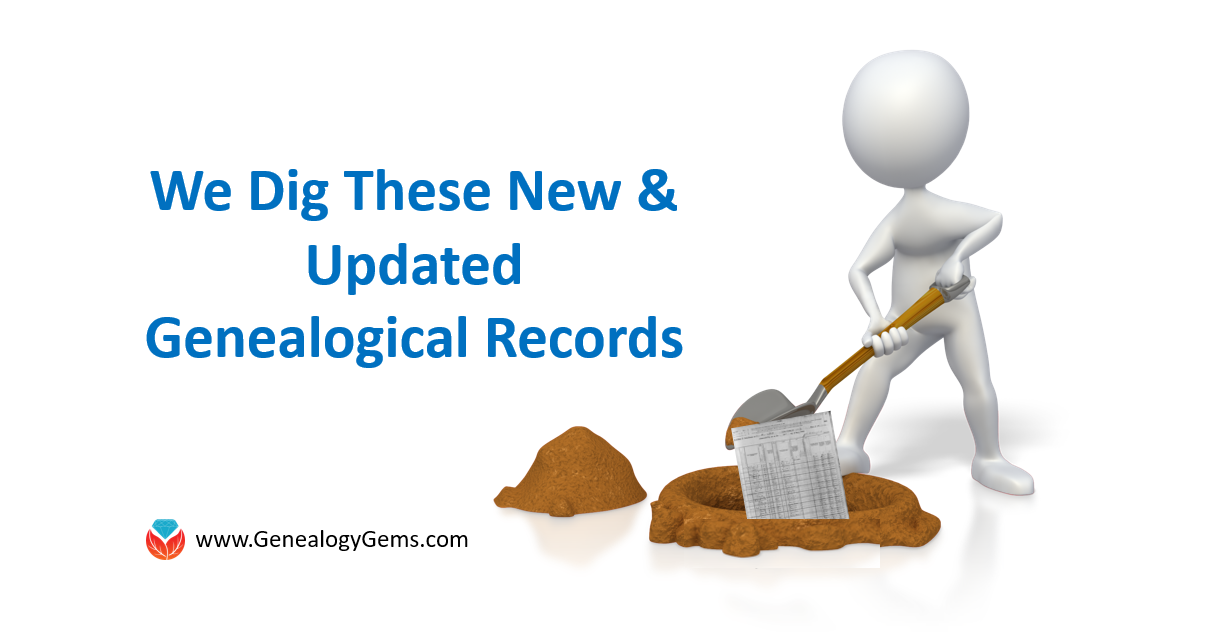
There are more online records than just those found at Ancestry, Findmypast, MyHeritage, or FamilySearch. Lesser known record collections pack a powerful punch to your family history research!
Swedish-American Newspapers
The Minnesota Historical Society has made some Swedish-American newspapers available online for the first time. This past week, Swedish-American Newspapers were made available through an online portal. Users can explore more than 300,000 pages from 28 different Swedish-American newspaper titles published across the U.S. between 1859 and 2007.
The portal is available in Swedish and English and includes a keyword search.
United States – North Carolina – Burke County – Yearbooks
The North Carolina Digital Heritage Center has a statewide digital publishing program located at the University of North Carolina at Chapel Hill. The center works to digitize and publish historic materials online.
Among their digital holdings, more than 60 years worth of yearbooks are now available to view online. The schools covered include:
Yearbooks provide enriching details into the lives of our ancestors and can be especially helpful in finding names of living family members!
United States – North Carolina – Militia
Also for North Carolina, the State Archives there have made their militia records, specifically the troop returns for the 18th and 19th centuries, available online.
The Troop Returns collection includes lists, returns, records of prisoners, and records of draftees, from 1747 to 1893. The majority of records are from the Revolutionary War, North Carolina Continental Line.
Militia records generally include the names of officers and soldiers, and are usually organized by district or county. Continental line records include field returns, general returns, draft records, and enlistment records.
This collection is a work in progress. As more records are digitized, they will become view-able online. In the meantime, see what’s there by checking out a helpful index in pdf form here.
Canada – Books
Though these new books added to the shelves of the Library and Archives Canada are not online, the information may be of value to you. Several new books are available to view in-person at the Library and Archives Canada.

Some of the new listings include:
Obituaries from the Christian guardian, 1891 to 1895, by Donald A. McKenzie (AMICUS 42197735)
American loyalists to New Brunswick: the ship passenger lists, by David Bell (AMICUS 43913838)
The link to the AMICUS record gives the call number you need to find the book on the shelves.
Baptisms and marriage books for several churches also are among the new publications. For a complete listing of the new books, click here: https://thediscoverblog.com/2016/10/28/new-books-in-the-genealogy-services-collection-at-395-wellington-october-2016/
Germany – Civil Registrations
New this week at FamilySearch.org are the Germany Bavaria Nuremberg Civil Registration 1803-1886 collection. This record set is an index only of over 1.2 million civil registrations.
The collection includes birth, marriage, and death records from Nuremberg.
Birth records may include:
- Name of child
- Names of parents
- Place of residence
- Gender
- Date of birth
Marriage records may include: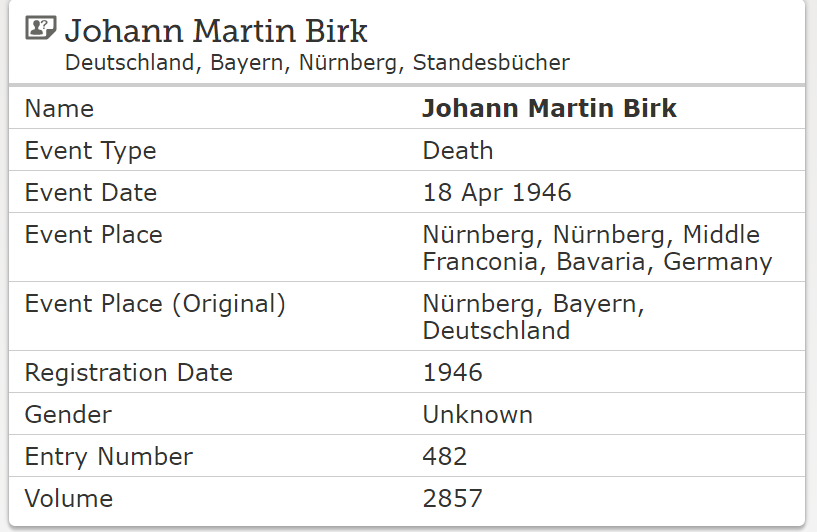
- Name of bride and groom
- Place of residence
- Name of bride’s parents
- Name of groom’s parents
- Groom’s date of birth and birthplace
- Bride’s date of birth and birthplace
Death records may include:
- Name of deceased
- Age at death
- Place of residence
- Date of death
United States – Utah – Divorce Records
Findmypast has added Utah Divorces to their collections. More than 177,000 records from Utah district courts cover the years of 1997 to 2016. Each result includes a transcript that will reveal the date the divorce was filed, the petitioner, respondent, attorney, case type, and the judgment that was reached.
Ireland – Cavan – Registers
Cavan Registers & Records currently includes only one title named “Crosserlough Census Index 1821.” The 1821 census of Crosserlough, County Cavan, was taken on 28 May 1821. The Four Courts fire in Dublin destroyed the original census documents, but a copy was made prior to this.
There are near 8,000 individuals listed in the 1821 census. Each entry records an individual name, age, occupation and relationship to the head of household.
Ireland – Kilkenny – Registers
Kilkenny Registers & Records are presented as PDFs. The collection includes the Castlecomer Census Index 1901 compiled in 2000 by Tom Delany.
The publication is a summary of the population of Castlecomer in 1901. It lists the names, ages, and occupations of the all the inhabitants. On image number 204 is the beginning of an index of all the names found in the publication to help you.
Ireland – Dublin – Registers
Ten new publications have been added to the collection of Dublin Registers & Records. These new items include school registers, district and street censuses, business directories, and monumental inscriptions. The collection also includes parish records from the Church of Ireland.
Ireland – Newspapers
Over 1.7 million new articles have been added to the historic Irish Newspapers collection. New additions have been made to existing titles including The Irish Times and The Weekly Irish Times.
Newspapers can be searched by time-frame, place, county, and newspaper title.
Scotland – Leith – Photographs
A picture is worth a thousand words, or maybe in this case, a thousand records! A rare collection of photographs from the 1920s in Leith, Scotland is available to view online. This collection was digitized by Edinburgh University.
Though most of the images are of buildings and streets and not well labeled, if you are familiar with the area, something might stand out to you. Take a stroll down memory lane of yesteryear in Leith Scotland by clicking here.
More Gems on Researching Newspapers for Genealogy

Available at www.shopgenealogygems.com
This week we explored Swedish-American newspapers as well as some from Ireland. Perhaps you are in search of newspaper elsewhere in the world. Lisa Louise Cooke presents everything you need to know about How to Find Your Family History in Newspapers. This exceptional book is packed with information on how to find and utilize newspaper collections. Available in book and e-book, you will find
- Step by Step Instructions
- Worksheets and Checklists
- Tons of Free Online Resources
- Websites that are worth Shelling Out a Few Bucks For
- A Massive Amount of Location Specific Websites (International)
- A Case Study that Puts It All to the Test


 was to be invited to keynote at the upcoming Midwestern Roots 2014: Family History and Genealogy Conference being held August 1 and 2, 2014, Indianapolis, IN, at the Indianapolis Marriott East.
was to be invited to keynote at the upcoming Midwestern Roots 2014: Family History and Genealogy Conference being held August 1 and 2, 2014, Indianapolis, IN, at the Indianapolis Marriott East.



